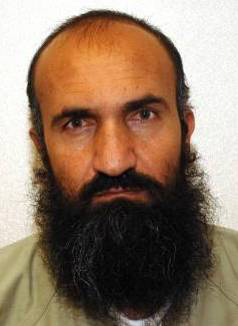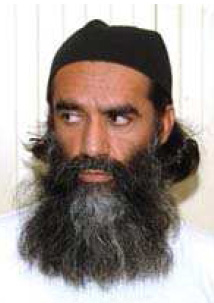The 5 Taliban traded for Sgt. Bowe Bergdahl
By Los Angeles Times staff
The United States released five prisoners from Guantanamo Bay, Cuba, in exchange for Army Sgt. Bowe Bergdahl, who had been captive for five years. Here are details on who they are.
Mullah Mohammad Fazl

According to a 2008 Defense Department document on his case, Fazl was born in 1967 in Uruzgan Province. He was the Taliban deputy defense minister during the U.S. invasion and commanded troops fighting the U.S. forces. According to a Defense Department official, Muhammad commanded the main force fighting the U.S.-backed Northern Alliance in 2001 and served as Chief of Army Staff under the Taliban regime. Fazl was detained after surrendering to Afghan Uzbek leader Abdul Rashid Dostam. He “wielded considerable influence throughout the northern region of Afghanistan,” the Pentagon said. He has been accused of war crimes during the Afghan civil war in the 1990s, including the murder of thousands of Shiites, the 2008 document said. “If released, the detainee would likely rejoin the Taliban,” it added.
Khair Ulla Said Wali Khairkhwa

According to a 2008 Defense Department document on his case, Khairkhwa was born in 1967 in Kandahar province. He grew up as a refugee in Pakistan He served as interior minister, governor of Herat and as a military commander and was directly associated with Osama bin Laden and Mullah Omar, the Taliban leader, the document said. According to a Defense Department official, he was an early member of the Taliban in 1994 and hails from the same tribe as President Hamid Karzai. Khairkhwa surrendered to Karzai’s brother before he was taken into custody in January 2002, the officials said. Khairkhwa’s most prominent position was as governor of Herat province from 1999 to 2001, the official said. He met with Iranian officials after Sept. 11, 2001, seeking military support against the U.S. and was associated with a military training camp run by Abu Musab al Zarqawi, a Jordanian militant later killed by the U.S. in Iraq. He was “probably one of the major opium drug lords in western Afghanistan,” the document said. He told interrogators he was a friend of President Karzai. In 2008, the Pentagon recommended against his release.
Mullah Norullah Noori

According to a 2008 Defense Department document on his case, Noori was born in 1967 in Zabul province. He was the senior Taliban commander in the northern city of Mazar-i-Sharif during the 2001 U.S. invasion. He was wanted by the United Nations for possible war crimes, including the murder of thousands of Shiite Muslims, the document said. He was the governor of Laghman and Balkh provinces during Taliban rule of Afghanistan and associated with Mullah Omar and senior Al Qaeda leaders, it said. According to a Defense Department official, Noori served as governor of Balkh province in the Taliban regime and played some role in coordinating the fight against the Northern Alliance. Noori was detained after surrendering to Afghan Uzbek leader Abdul Rashid Dostum. In 2008, the Pentagon recommended against his release.
Abdul Haq Wasiq

According to a 2008 Defense Department document on his case, Wasiq was born in 1971 in Ghazni province. He served as deputy minister of intelligence during the Taliban’s rule and was involved in recruiting other militant groups to fight against the U.S. after the 2001 invasion of Afghanistan, the document said. A Defense Department official said his cousin was head of the intelligence service. He used his office to support Al Qaeda and “arranged for Al Qaeda personnel to train Taliban intelligence staff,” it said. He told interrogators that he offered to help the U.S. locate Mullah Omar before being sent to Guantanamo Bay. In 2008, the Pentagon recommended against his release.
Mohammad Nabi Omari

According to a 2008 Defense Department document on his case, Omari was born in Khost province in 1968. He was a “senior Taliban official” with close ties to Al Qaeda, the Haqqani Network and other groups that fought the U.S. in Afghanistan, the document said. He was a member of a militant cell in Khost that attacked U.S. troops and facilitated the smuggling of weapons and fighters, the document said. A Defense Department official called him “a minor Taliban official in Khost.” He told interrogators that in 1982 he left the Taliban and started working with a CIA operative named Mark, who “tasked him to find” Mullah Omar. He was arrested at the Khost airport by the U.S. in Sept. 2002, he told interrogators. In 2008, the Pentagon recommended against his release.
Credits: Los Angeles Times